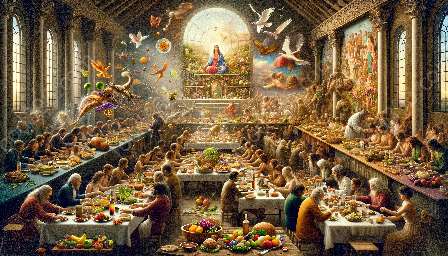Food is not just essential for our physical sustenance; it also serves as a powerful symbol of status and power in various cultures and societies around the world. This complex interplay between food, social structures, and history sheds light on the multifaceted ways in which food reflects and influences social dynamics.
Food as a Symbol of Status and Power
Throughout history, the consumption and display of certain foods have been closely linked to social status and power. In many societies, access to rare and exotic ingredients, lavish feasts, and elaborate culinary traditions has been used to signify wealth, influence, and prestige. Plate presentation, the use of fine china and silverware, and the ability to host extravagant banquets have long been associated with high social standing.
Moreover, in feudal societies, the allocation and consumption of food were often key markers of hierarchical structures, with the ruling elite having access to the most desirable and luxurious provisions, while the lower classes made do with simpler fare. These historical dynamics continue to influence contemporary perceptions of food as a symbol of social hierarchy and power.
Food and Social Structures
Food practices are deeply ingrained in social structures and can both reflect and reinforce existing societal hierarchies. The availability of certain foods, dietary restrictions, and culinary traditions can serve as markers of social identity and differentiate between various social classes and ethnic groups.
Furthermore, the act of dining itself can be a highly structured social activity, with specific etiquettes, seating arrangements, and meal service protocols that reflect and reinforce social hierarchies. In many cultures, communal dining and food sharing can also strengthen bonds within social groups, while simultaneously highlighting distinctions in power and status.
Food Culture and History
The cultural significance of food goes beyond its immediate consumption and encompasses a rich tapestry of historical, geographical, and social influences. Traditional culinary practices, recipes, and dining rituals often trace their roots back to specific historical events, migrations, and trade routes, shaping the unique food cultures we observe today.
Moreover, the historical context of food can shed light on power dynamics, as the control over food production, distribution, and access has played a pivotal role in shaping the course of societies and civilizations. From ancient empires to modern industrialized nations, the history of food and its utilization as a symbol of power has left an indelible mark on cultural and societal development.
The Intersection of Food, Status, and Power
The interweaving of food, status, and power is a dynamic and evolving phenomenon that continues to shape the cultural and social landscapes of diverse communities. The symbolism of food as a marker of social standing and influence varies widely across different cultures, yet underlying themes of abundance, scarcity, and luxury remain universal in their implications for social hierarchies.
Furthermore, the global exchange of culinary traditions, the rise of food globalization, and the democratization of haute cuisine have led to new expressions of status and power through food. The emergence of celebrity chefs, food influencers, and gourmet experiences has redefined the ways in which food is used to signal influence and prestige in the modern era.
As we navigate the complexities of food as a symbol of status and power, it is essential to recognize the intricate connections between food, social structures, and historical legacies. By understanding the nuanced roles that food plays in shaping identities, social dynamics, and cultural narratives, we can gain a deeper appreciation for the profound significance of food in our lives.

